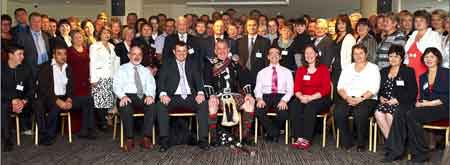



Quality Counts at Aviagen's Russian Seminar
RUSSIA - Quality was the watchword at Aviagen's annual Russian seminar, which was held recently in Moscow.The seminar's main theme was 'quality counts'. Over 100 delegates attended the event and were given presentations and practical demonstrations looking at the entire lifecycle of a broiler from hatching right through to processing.
The first presentation of the day, focussing on hatchery practice, was given by Dr Steve Tullett, a specialist who works closely with Aviagen.
Other speakers at the event included Susan Bibby, Aviagen veterinarian, who discussed and demonstrated how to properly assess chick quality; Danny Rotherham, Area Technical Manager, talked about producing quality broiler meat and Jonny Harrison, Regional Technical Manager, spoke about broiler economics.
Ms Bibby's talk demonstrated that lesions that can be detected in day-old chicks could give an indication of areas to focus on during incubation to improve the quality of the chick and was followed by a practical session actually looking for these lesions. This meant customers split into four groups to be led through the process of chick assessment and discussing the lesions found.
Attendees were also given a unique insight into research on cost-effective nutrition, which has taken over four years to complete. Mr Harrison explained: "This project is something we have worked on for many years. We recognise that feed is one of the most important economic factors in broiler production. The research showed breed comparisons, based on actual flock data and nutritional specifications for different breeds. The results taken from farms across the globe show that Aviagen recommended feeding patterns are very cost effective compared to different genotypes."
The event was also an opportunity for Russian customers to meet Danny Rotherham in his new role as the Area Technical Manager for Russia as Jonny Harrison leaves the region to take on a more global role in the Technical Transfer department.
Mr Rotherham summed up the presentations, saying: "Steve's presentation outlined a number of factors from the breeder farm to the hatchery and broiler farm that affect chick quality. The use of simple, readily available thermometers, of the type each attendee received as a free gift, to simply measure the temperature of eggs and chicks, was a focus of his talk.
"We also made excellent use of images taken from our thermal imaging camera which has really opened up a new world of thinking at the incubation and hatching stage. The ability to actually see temperature fluctuations in a room has led to huge leaps forward in chick quality.
"Finally, I spoke about optimising brooding and the improvements that can be gained by getting the start right.
"It was great to be able to physically show our customers some simple and practical ways of looking at their chicks and to help them to improve the performance of their stock. I am looking forward to my new role in Russia to develop this kind of work more and more."
Nikolai Makovkin, head vet at Stavropolsky Broiler, who attended the event, said: "All the presentations were very interesting but the presentation of Dr Tullett had a compelling format for presenting complex information that was easy to understand and remember.
"I found the concept of optimal incubation time totally gripping. The simple analysis of the timing of a hatch window and the actual hatch and also the observation of egg shells was a new concept for me. This suggested a very simple technique for monitoring the incubation process that leads to a better understanding. For our production the chick quality is very important, therefore understanding the correct hatching process is one of the key factors to increase the quality of the end product."













